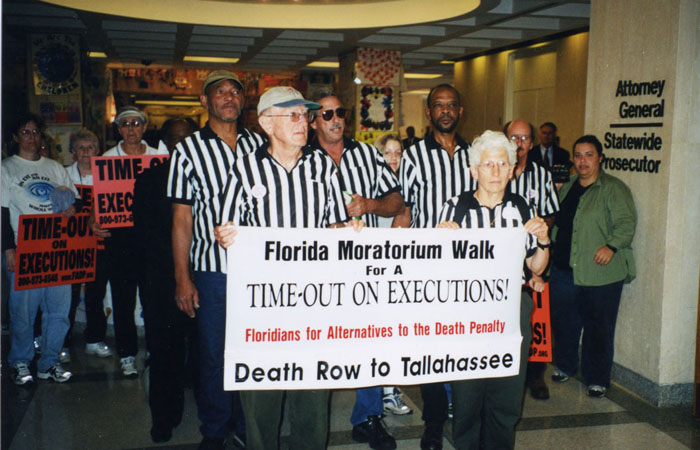Collections : [National Death Penalty Archive]
National Death Penalty Archive
Researchers, writers, activists, and records on capital punishment in the United States.
Search Constraints
Start Over You searched for: Collecting Area National Death Penalty Archive Remove constraint Collecting Area: National Death Penalty Archive Date range 1978 Remove constraint Date range: <span class="single" data-blrl-single="1978">1978</span>Search Results
Administrative Files, 1977-2005, Undated 1.9 cubic ft.
Series 1 contains documents relating to the internal procedures and finances of Murder Victims' Families for reconciliation. While there are a few documents that provide evidence of how the organization was set up, the majority of documents focus on hiring, day to day finances, and committee meetings. There are also materials related to strategic planning and the creation of by-laws and organizational procedure. Although the series contains materials from 1977 to 2005, the bulk of the material is from 1996 to 2004. Contained in this series are meeting agendas, meeting minutes, meeting summaries, correspondence, annual reports, ballots, evaluation forms, applications, newsletters, fliers, budgets, financial reports, manuals, by-laws, pamphlets, drafts, notes, reports, contracts, forms, resumes, proofs, floppy disks, and cassettes.
Administrative Files, 1981-1990, Undated 0.5 cubic ft.
This series contains information on the daily, monthly, and yearly operational duties of the Southern Coalition on Jails and Prisons. There is a general correspondence file containing information about the day-to-day operations of the Coalition, a specific file dedicated to correspondence with the Law Offices of Woods and Woods, and material from the various boards of directors within the Coalition (including meeting minutes). There are also documents related to updates made to the Coalition's by-laws in the late 1980s.
Alvin Ford Papers, 1965-1995 5.4 cubic ft.
Bill Babbitt Collection, 1967-2016 4.82 cubic ft.
Bill Pelke Papers, 1965-2007, Undated 18.32 cubic feet
Biographical, 1950-1998 0.17 cubic ft.
This series contains two large bibliographies of Ernest van den Haag's writings. The first bibliography covers his works from 1950-1982. The second includes his writings up to 1998. These bibliographies organize his writings alphabetically by topic and each publication includes an assigned number. These numbers do not reflect a strict, but rather general chronological order (i.e. number one was published in 1968 while number two was published in 1954). The numbering system probably reflects the order in which the articles were begun. Some were published quickly while others took longer. This series also contains van den Haag's curriculum vitae from 1973-1998 as well as short biographies from 1973-1989.
This series consists of correspondence, meeting minutes of the Board of Directors (1977-1985) and the Executive Committee (1971-1973, 1984), and committee files created or gathered by the executive director, chairman, president, general secretary, and committee chairs of the Association. It also contains biographical information about prospective board members gathered by the Nominating Committee (1963-1967, 1969, 1971-1972, 1974-1982, 1984). Other documents in the series include meeting agendas, memoranda, grant proposals, reports, membership statistics, and records concerning bequests and endowments made to the Association. This material concerns prison conditions, children of offenders, sentencing policies, court rulings concerning prisoners' efforts to form labor unions, construction of new correctional facilities, and the operations of the Association itself. Letters from inmates concerning living conditions in various correctional facilities, transfers from one facility to another, health issues, allegations of abuse by corrections officers, and post-release work arrangements and drug-rehabilitation programs are scattered throughout the series. One of the letters (1985) directed to Correctional Association President Robert Gangi was written by Jean Harris, who became interested in the special problems of female inmates and their children during her imprisonment for murder. Note that the files created by the Institution's Visiting Committee are housed in Series 3, Prison Visits Files, circa 1915-1985, and files created by the Narcotics Committee are housed in Series 4, Narcotics Committee Files, 1949-1975.
